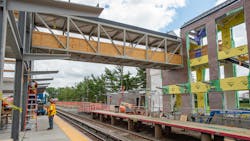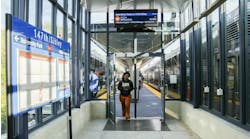LIRR Expansion Project progresses ahead of schedule, under budget in 2020
The Metropolitan Transportation Authority (MTA) successfully completed the elimination of railroad crossings and station enhancements as part of the LIRR Expansion Project, which will add a third track from Floral Park to Hicksville to reduce train congestion and delays.
These milestones, and others, were met ahead of schedule and under budget despite the challenges of a global pandemic throughout 2020.
MTA Construction & Development (C&D) and MTA Long Island Rail Road (LIRR) contractors successfully advanced an array of projects in 2020, setting the stage for what MTA C&D expects to be another successful year in 2021 – with the remaining railroad crossings to be eliminated, the last of the seven bridges to be replaced, enhanced stations either completed or begun and more.
“The year 2020 was incredibly challenging, but we kept on schedule – and budget – on a huge range of important projects, like the LIRR Expansion Project (Third Track) and the new East End Gateway to Penn Station,” said Janno Lieber, president of MTA C&D. “Key project elements like the railroad crossing eliminations and station enhancements on Third Track are already delivering benefits for Long Islanders. Capped by the opening of the magnificent new Moynihan Train Hall, 2020 demonstrated the results of Governor Cuomo’s determination to transform LIRR customers’ experience.”
"The challenges we faced in 2020 were unlike anything we've ever encountered before, but that didn't stop our incredible workforce from accomplishing several vital safety and reliability service improvements while simultaneously modernizing our system,” said Phil Eng, president of MTA LIRR. “I’m thankful for all the men and women of the LIRR and MTA who helped deliver these substantial improvements that are enhancing service every single ride for those that rely on LIRR today, and for future generations.”
Railroad crossing eliminations
Eliminating railroad grade crossings enhances safety by eliminating the possibility of train/vehicle conflicts. It also enhances quality of life, as trains no longer need to sound their horns, and crossing gate bells are removed. Five railroad crossings were eliminated in 2020.
The School Street undergrade crossing on the border of Westbury and New Cassel features a two-lane roadway with a pedestrian walkway on the east side. New York L.t Gov. Kathy Hochul, MTA C&D President Janno Lieber and other dignitaries cut the ribbon to open the roadway in November. The bridges carrying the LIRR over the underpasses were constructed on site and pushed into place during service outages in just one weekend. Service was restored in both instances in time for the Monday morning rush hour commute.
Also in November, the two railroad crossings at Willis Avenue in Mineola – one at the Main Line and one at the Oyster Bay branch – were closed in November in preparation for construction of an underpass to replace both railroad crossings.
The S. 12th Street railroad crossing in New Hyde Park was permanently closed in October to make way for the construction of an ADA-compliant pedestrian underpass.
At New Hyde Park Road on the Garden City/New Hyde Park border, a five-lane underpass was constructed with two lanes in each direction and a turning lane on both the north and south side of the underpass, as well as pedestrian walkways on both the east and west sides of the underpass and a pedestrian walkway over the underpass’ south side. New York Gov. Andrew M. Cuomo, MTA C&D President Janno Lieber and LIRR President Phil Eng cut the ribbon, officially opening the roadway in August.
Bridge replacements
MTA says low-hanging bridges have been the site of many accidents over the years as trucks strike the bridges causing structural damage and train delays. Bridge replacements with new height requirements allow trucks to safely pass underneath.
During a Main Line service outage on the weekend of Sept. 19-20, MTA C&D installed the steel girders over the Meadowbrook Parkway, in Carle Place, that will carry the LIRR’s third track. The bridge, owned by the New York State Department of Transportation, has been in service since 1956 and maintains its current 13’ 2” clearance since commercial traffic such as tall trucks are not permitted on the parkway.
The MTA replaced the 78-year-old Glen Cove Road bridge in Carle Place. Using a method successfully employed at Nassau Boulevard and Cherry Lane among other locations, the new bridge was built on site and then during a weekend double track service outage on June 29 the old two-bay bridge was removed and replaced with a new three-bay bridge to accommodate the future third track.
In April, the Plainfield Avenue bridge modification project was completed. The bridge, located in the village of Floral Park and in service since 1958, received a new single-track span to accommodate the additional track with the LIRR Expansion Project.
The Linden Avenue underpass was also completed in April. It is the only pedestrian access to the Floral Park Pool and Recreation Center from the north side of the LIRR Main Line. It was demolished and reconstructed to accommodate the new third track to be added to the Main Line.
Station enhancements
Three station enhancements were also completed in 2020. Station enhancements include several upgrades such as new platforms, stairways, elevators and canopies.
The first phase of Lynbrook Station rehabilitation was completed in October. The four-track elevated station features two new island platforms, platform canopies and other customer-friendly amenities. The station, which is located at Sunrise Highway and Peninsula Boulevard in the village of Lynbrook, was built in 1936 and serves approximately 5,000 weekday riders.
In May, the MTA completed its upgrade and renewal of the Murray Hill station, including major accessibility improvements. The station now has two elevators, one each for the eastbound and westbound platforms. Crews also installed renewed retaining walls, new lighting, security cameras, signage and pigeon abatement measures.
ADA elevators, new platforms and canopies were among the transformative upgrades completed at Nostrand Avenue Station in Brooklyn in January.
Switches and substations
A significant amount of work also took place on infrastructure that is vital to bigger and more public-facing projects as part of LIRR Expansion. Switches for two interlockings – Nassau 1 and Nassau 3 – were installed during a series of weekend service outages. Interlockings enables the LIRR to move trains from one track to the other, making it possible for trains to be rerouted to other tracks in the event of a disabled train. Coupled with the third track when installed, this ability will greatly enhance service reliability, improving the ability to recover from system problems.
Installation of components necessary to power trains and signals also moved ahead this year. Electrical substations, which adjust voltage for use on the LIRR were installed in Floral Park, Freeport and New Cassel. Also, largely out of the public eye was the expansion of the Mid-Suffolk Train Storage Yard. The newly expanded yard will provide additional space to store, maintain, inspect and clean electric train cars. With COVID-19 still a serious health issue, cleaning of trains has become vital in combating the disease. The yard features 11 additional tracks, each with capacity for a 12-car train set.
Looking ahead
In all, when the LIRR Expansion Project is completed, eight railroad grade crossings will have been eliminated, seven bridges replaced or expanded, five stations completely rebuilt, 10 miles of a third track installed and infrastructure such as power substations and interlockings built.


